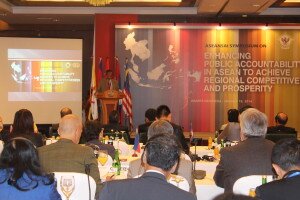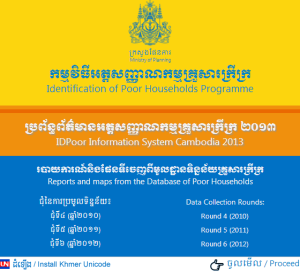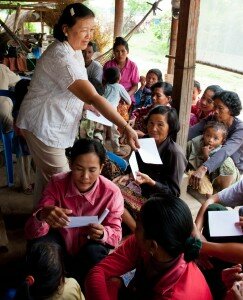GIZ Supports South-East Asian Countries for Enhancing Public Accountability of their Audit Institutions
19 January 2014
Jakarta, Indonesia. 19th January 2014. Seven ASEAN member states (Brunei Darussalam, Cambodia, Indonesia, Lao PDR, Malaysia, the Philippines and Vietnam) reached an agreement to implement measures for improving transparency and efficiency of their Supreme Audit Institutions in a meeting supported by GIZ.
The ASEAN member states participating in the symposium ‘Enhancing Public Accountability in ASEAN to achieve Regional Competitiveness and Prosperity’, organized in Jakarta (Indonesia), have decided to take crucial steps to overcome barriers for public auditing by 2017. These measures include: 1) To amend existing laws and regulations or to develop new regulations to strengthen the institutional and organizational capacities and autonomy of Supreme Audit Institutions; 2) To engage more actively with auditees and stakeholders such as the Public Accounts Committees, civil society, media and the public; 3) To increase awareness on public accountability amongst decision makers, politicians, etc.; and 4) To strengthen networking and sharing of good practices amongst ASEAN’s Audit Authorities.
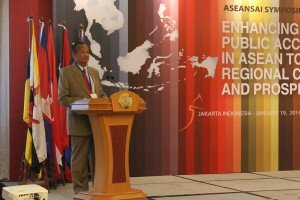
Mr Tan Sri Dato’ Setia Ambrin Buang, Auditor General of Malaysia and Chairman of ASEANSAI Knowledge Sharing Committee of ASEANSAI
Tan Sri Dato’ Setia Ambrin Buang, Auditor General of Malaysia and Chairman of ASEAN Supreme Audit Institutions’s Knowledge Sharing Committee, presented a summary of results agreed by representatives from ASEAN member states during the meeting. The Malaysian Auditor General also highlighted a number of constraints for an effective public auditing system in the region: weak law enforcement; lack of coordination and cooperation between Supreme Audit Institutions and audited entities; limited parliamentary oversight; low transparency in public reporting; lack of mechanisms to ensure audited entities follow-up on Supreme Audit Institutions’ recommendations; and lackof qualified human resources, amongst others.Supreme Audit Institutions play a key role to promote good governance and monitor public finances. These institutions ensure that public finances are managed in compliance with state regulations in an efficient, accountable and transparent way. Supreme Audit Institutions also strengthen capacities of civil servants to ensure that their roles and responsibilities are clear as well as to facilitate their participation for monitoring governments’ public expenditures.
For more information, please visit the ASEAN Supreme Audit Institutions’ website: www.aseansai.org
Key Data on Poor Households from the Ministry of Planning available
11 March 2014
A new data set on poor households from seven provinces and the rural areas of Phnom Penh is now accessible and can be used by government institutions, non-governmental organizations and specialized aid agencies in order to target services and development assistance to the people living in poverty more effectively.
With support from the Identification of Poor Households program -implemented by the Ministry of Planning of Cambodia and its provincial departments with technical support from GIZ- the Ministry has just made available more data of households identified as poor in Kampong Cham, Kampong Thom, Siem Reap, Beantey Meanchey, Kratie, Oddar Meanchey, Stung Treng and the rural areas of Phnom Penh.
This data includes lists of poor households with their poverty category; details of all members of poor households (name, sex, age/year of birth, relationship to head of household); photos of poor households; poverty rates at the levels of village, commune, district and province: household-based and person-based; and aggregated socioeconomic and other special characteristics of poor households.
The data is presented in form of reports (pdf and excel formats) and maps: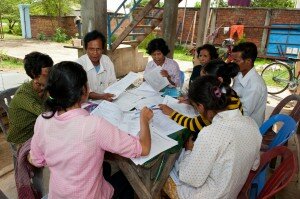
Report 10: Summary statistics (per province)
Report 13: Poor household list
Report 8: Profile of all household members
Report 14: Poverty Rate Comparison Report (district, commune/Sangkat, and village levels)
Report 15: Names and photos of poor household members (to be provided as per requested by users with approval from the Identification of Poor Households program).
Report 16: Household data summary (to be provided as per requested by users with approval from the Identification of Poor Households program).
Access to some information is restricted due to its personal nature. In order to receive it, the user (a person on behalf of the institution or organization) will be required to register as a data user and to request permission from the Identification of Poor Households program ().
GIZ provides advisory support to the Ministry of Planning and its provincial departments in all steps of the implementation of the Identification of Poor Households program and supports relevant capacity development measures (). The Identification of Poor Households program is funded by the German Federal Ministry for Economic Cooperation and Development (BMZ), DFAT, UNICEF and the Royal Government of Cambodia.
